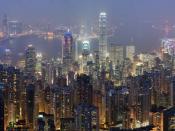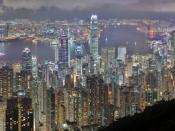Introduction
As British colonial rule in Hong Kong has come an end, the "new" local government finds itself in a political environment that is unprecedentedly turbulent. The upholding of "one country two system" has resumed the sovereignty over the territory and the involvements of China in Hong Kong domestic affairs have inevitably increase so as the dampening effect in democratization. However the "new" government led by Mr. Tung has not yet escaped from the administration-led notion build up by the colonial political regime and the incessant political challenges after 1997 did neither changed it. The political reality is that political anxieties and fears engendered by uncertainties associated with social, economical and political after 1997 have raised consciousness and spurred political demands on the government.
Has the political changes transformed the attitude of Hong Kong people towards democracy? To explore the issue I would first summarize the finding of the article "Political values" in "The ethos of the Hong Kong Chinese" and would focus the discussion on the political participation of Hong Kong Chinese.
Political Values - The ethos of the Hong Kong Chinese
Mild Democratic Aspirations
Public satisfactory with the existing political system does not mean that Hong Kong people lack the desire for institutional changes. However it is subjected to certain circumstances. 79.3 percent of respondents agreed and 7.2 percent strongly agreed that any political reform should be gradual . This indicated a passive response of the Hong Kong Chinese to the call for Democratization and their conservation orientation.
A plurality of respondents (43.9 percent) tended to define democratic government as a government that consults public opinion rather than one that is popularly elected . Accordingly, democratic reform as expected by many people was basically the improvement of the existing system rather than a drastic departure from it.
Traditionalistic Concept of Good Government
Hong Kong peoples held traditional view toward the concept of a good government, as the study revealed. It was seen as an instrumental and pragmatic in the sense that the government was perceived primarily as service deliverer and benefactor with unlimited resources that intervention social affairs is also legitimate. There was desire to achieve a paternalistically government that in contradiction to the wide accepted view of limited government on economic affairs
Political involvement
It was generally perceived that political interest was remained low in Hong Kong, revealed in a survey commissioned by the South China Morning Post in 1986, that political matters ranked very low in the priority list of tasks for the government . It is not difficult to find out the reason for it. The pervasive sense of political powerlessness was the main reason for it. Most people in the survey believed that they could have little influence on the government's local politics and denied that they had any power to change the actions of the government.
Origin of Conservatism
Under the governance of colonial government, the sense of political powerlessness among public prevailed but did not led to social unrest. The colonial political system was popularly accepted and the performance of the Hong Kong government was rated favorably. The legitimacy enjoyed by the colonial government had set Hong Kong apart from other colonies. The pace of democratization is sluggish however the underlying causes of these conservation notions were generally accepted by most of the Hong Kong people.
It is interesting that although Hong Kong people are deprived of political power, they are compensated for through the freedom to make money under fair legal system. The ever blooming economy since 1980 has increased the wealth of Hong Kong to the extent that economic affairs matter than political. Public generally appreciated the government's effort's at promoting economic development therefore the interest between the government and the public came without great challenge. Economic as a tool of governance ensured the colonial government enjoyed relatively stable status.
Chinese values also weight. The concept of democracy of Chinese is not quite the same as that in the West. What the people enjoy is a stable politics environment with a benign government with some non-democratic features where universal suffrage is not prerequisite of a democratic government. They were prepared to play the role such as monitoring the government and respecting the authority but not to actively involve in the politics.
Traditional Chinese Values did influence the Hong Kong politics culture. Confucianism strongly opposed to critical and dissenting view. In that sense if different opinion spoken out without limitation, they would confuse people's thought and destroy people's identity to the authority. Contending to the authority may led to lethal consequence as shown in the Chinese history and the cruelest period perhaps was the Cultural Revolution.
However western political values also impact on the local political culture such as rule of law. The rule of law is generally held to be far more important than capable leaders. But serving as a colonial ruler, the British Hong Kong government did not democratize Hong Kong to a fully democratic city.
1, July Protest - A call for political participation?
If we conceived that Hong Kong people is low in political sentiment, we would draw to the conclusion that people's attempts to democratize politics would be kept in a constrained way. As the study revealed Hong Kong Chinese is primarily instrumental toward politics , that majority of respondents related political participation to the enhancement of privates, transformation of political culture appears to be gradual unless otherwise.
Hong Kong is a unique place where western and Chinese values mixed. As discussed in Lau (1988) Traditional Chinese values do rooted in the civil culture and western values also influence Hong Kong by the colonial government. After 1997, Hong Kong resumed its sovereignty and operating under " one country two system ". The political system has not yet made any significant changes as to maintain stability. Overwhelming endorsement of the existent political system has not surprised at all.
1 July Protest shed new light in the study of civil culture. As we generally accepted that the ethos of utilitarian families and apolitical culture of people living in postwar Hong Kong are the stabilizing factors of the society, the outbreak of hatred and grievances in the Anti-Article 23 protest has dramatically changed our perception towards Hong Kong civil culture.
One of the questions we would like to ask is the "actuality" of the result of the study and the metaphors we generally used to characterize the culture and lifestyle of people in Hong Kong. The study of Lau characterized Hong Kong people as conservative in politics but the mass protest at 1 July has demonstrated a different picture. There are amply of explanation to the outbreak of such hatred and dissatisfaction shown in the 1,July protest. I am not going to discuss it here, as there is many analyses provided elsewhere. Concerning the civil culture discussed in the study, it is important for us to think that whether people actually behave such as way that interpretive analysis could be explained. Moreover we might probably overlook the historical peculiarity of socio-political processes that give rise to such an event.
In the article of Allen Chun about Hong Kong identity, she said that " ... the maintenance of an apolitical façade has more than just a matter-of-fact tone to it. The institutionalization of an apolitical mentality and lifestyle ultimately has the goal of deflecting the very violence of colonial power that maintains the system, much like the way the virtues of utilitarian progress has obscured the exploitative dimensions of capitalism. Whether Hong Kong's political system or social lifestyle has remained colonial, despites names to the contrary, is a matter of interpretation, but the discursive fictions are an important aspect of understanding the nature of the underlying institutional reality. In this regard, one cannot easily separate the regime of colonialism from nationalism or even modernity. The attachment to the notion of colonialism or nationalism are trendy topic to the discussion of culture identity but the expressions of different sentiment has inevitably posed subjective distance from its object, the Hong Kong citizen itself.
In a broad term, civil culture includes everyday life of Hong Kongers. However, new movement does always occur in our daily life that beyond the expectations of any literature reviews. The reason maybe that there is lack of well-developed civil culture or more importantly, the unique identity of Hong Kong to provide ground for concrete discussion. As Allen Chun commented that " efforts to increase direct democratic participation in the election of legislators and running of government continue to be fought for and frustrated, and such efforts have mostly been pursued without regard to culture and identity issues . The relevance of government and politics does matters. However it is without doubt that there is no firm indication that local identity can provide available political leverage to achieve a better end on the relevance.
Conclusion
In discussion of political participation, with reference to the study, the issues of local autonomy, civic culture and democratization in the political arena, are largely mutually distinct and departed. The cultural and identity matters are that of arbitrariness in a situation that it is hard to find a relevant kind of institutional reality that proven useful to determine in the public sphere. The ambivalence toward the government and the political of Hong Kong as shown in the 1, July protest provided evidence that strands of alienation, cynicism and suspicion toward the Hong Kong government has not faded out after 1997. The degree of political participation remains a controversial topic to discuss the unique civil culture in Hong Kong.


